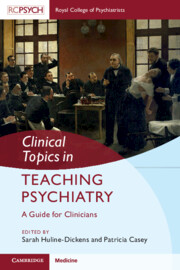Book contents
- Clinical Topics in Teaching Psychiatry
- Clinical Topics in Teaching Psychiatry
- Copyright page
- Dedication
- Contents
- Contributors
- A Note on the Cover
- Introduction
- Section 1 Teaching and Preparation
- Section 2 Teaching Methods
- Section 3 Feedback, Assessment and Supervision
- Section 4 Bridging the Gaps: Foundation Years and Interprofessional Education
- Section 5 Technologies Old and New
- Chapter 17 Portfolio-Based Learning in Medical Education
- Chapter 18 Bringing Smartphone Technology into Undergraduate and Postgraduate Psychiatry
- Chapter 19 Evidence-Based Mental Health and E-Learning
- Chapter 20 PowerPoint: Avoiding the Slide to Damnation
- Chapter 21 Virtual Teaching and Learning in Psychiatric Medical Education
- Section 6 Supporting the Trainee in Difficulty
- Index
- References
Chapter 17 - Portfolio-Based Learning in Medical Education
from Section 5 - Technologies Old and New
Published online by Cambridge University Press: 24 November 2022
- Clinical Topics in Teaching Psychiatry
- Clinical Topics in Teaching Psychiatry
- Copyright page
- Dedication
- Contents
- Contributors
- A Note on the Cover
- Introduction
- Section 1 Teaching and Preparation
- Section 2 Teaching Methods
- Section 3 Feedback, Assessment and Supervision
- Section 4 Bridging the Gaps: Foundation Years and Interprofessional Education
- Section 5 Technologies Old and New
- Chapter 17 Portfolio-Based Learning in Medical Education
- Chapter 18 Bringing Smartphone Technology into Undergraduate and Postgraduate Psychiatry
- Chapter 19 Evidence-Based Mental Health and E-Learning
- Chapter 20 PowerPoint: Avoiding the Slide to Damnation
- Chapter 21 Virtual Teaching and Learning in Psychiatric Medical Education
- Section 6 Supporting the Trainee in Difficulty
- Index
- References
Summary
Portfolio-based learning is relatively new to medical education and, in many ways, quite far removed from the more traditional instructional pedagogy that has been associated with the education of doctors for centuries. Despite that, the use of portfolios has rapidly expanded in recent years. This increased popularity is clearly set against a background of important changes and new trends in medical education. Before considering further the use of portfolios, it is useful to understand some of these changes as the contextual factors on which the search for new and creative learning and assessment strategies (which include portfolio-based learning) is predicated. We will particularly focus on.
- Type
- Chapter
- Information
- Clinical Topics in Teaching PsychiatryA Guide for Clinicians, pp. 199 - 211Publisher: Cambridge University PressPrint publication year: 2022

